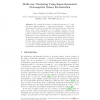Free Online Productivity Tools
i2Speak
i2Symbol
i2OCR
iTex2Img
iWeb2Print
iWeb2Shot
i2Type
iPdf2Split
iPdf2Merge
i2Bopomofo
i2Arabic
i2Style
i2Image
i2PDF
iLatex2Rtf
Sci2ools
101
click to vote
ECCV
2006
Springer
2006
Springer
Multi-way Clustering Using Super-Symmetric Non-negative Tensor Factorization
Abstract. We consider the problem of clustering data into k 2 clusters given complex relations -- going beyond pairwise -- between the data points. The complex n-wise relations are modeled by an n-way array where each entry corresponds to an affinity measure over an n-tuple of data points. We show that a probabilistic assignment of data points to clusters is equivalent, under mild conditional independence assumptions, to a super-symmetric non-negative factorization of the closest hyper-stochastic version of the input n-way affinity array. We derive an algorithm for finding a local minimum solution to the factorization problem whose computational complexity is proportional to the number of n-tuple samples drawn from the data. We apply the algorithm to a number of visual interpretation problems including 3D multi-body segmentation and illumination-based clustering of human faces.
Computer Vision | Conditional Independence Assumptions | Data Points | ECCV 2006 | Factorization Problem | N-way Affinity Array | Super-symmetric Non-negative Factorization |
| Added | 16 Oct 2009 |
| Updated | 16 Oct 2009 |
| Type | Conference |
| Year | 2006 |
| Where | ECCV |
| Authors | Amnon Shashua, Ron Zass, Tamir Hazan |
Comments (0)

